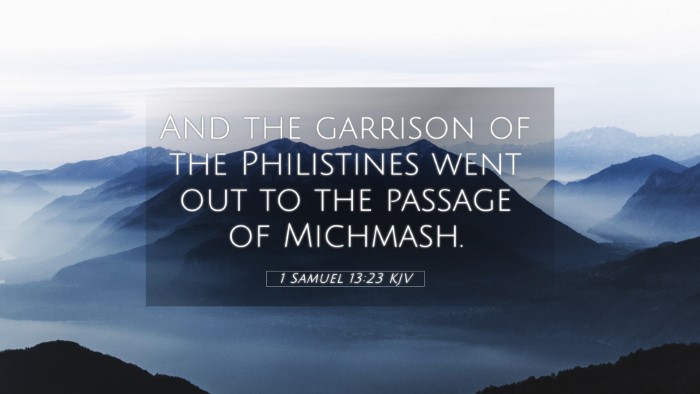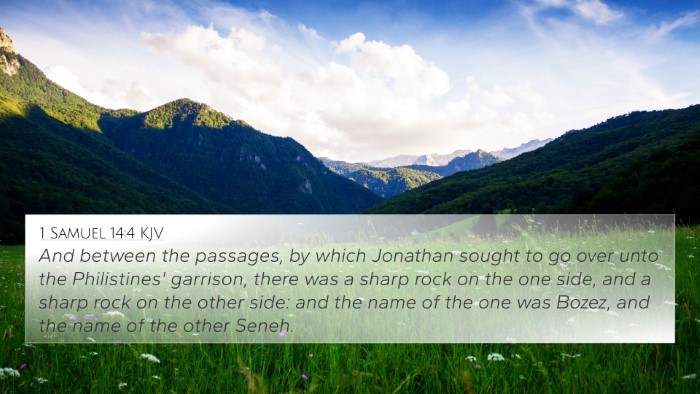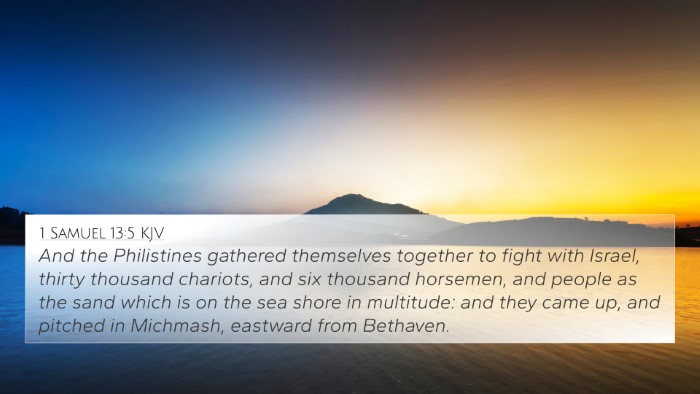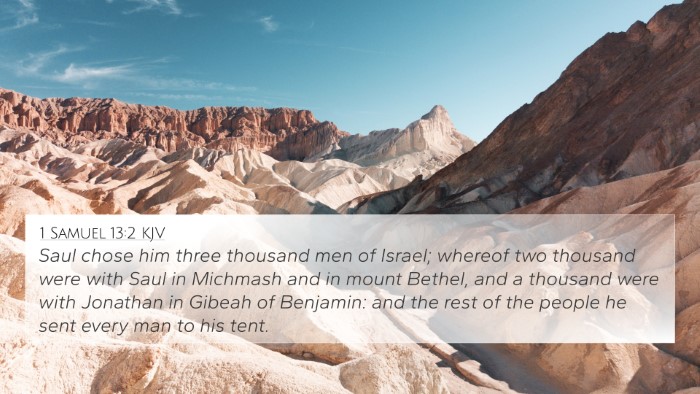Understanding 1 Samuel 13:23
1 Samuel 13:23 states, "And the garrison of the Philistines went out to the passage of Michmash."
This verse provides a crucial point in the narrative of Israel's struggles against the Philistines, outlining the military posture of the enemies and foreshadowing the tension that follows.
Summary of Biblical Context
In this chapter, Saul is king over Israel, and the situation is deteriorating due to military pressure from the Philistines. The implications of the verse indicate a strategic movement of the Philistines that poses a significant threat to Saul and his forces.
Commentary Insights
-
Matthew Henry:
Henry emphasizes the military dynamics at play, noting how the Philistines' aggressive advancements signify a time of trial for Israel. The mention of Michmash highlights its geographical and tactical importance in the conflicts faced by Israel.
-
Albert Barnes:
Barnes points out that the tension illustrated in this verse reflects not only the external enemies but also the internal struggles within Saul’s leadership. The Philistines' garrison serves to underline Saul's precarious situation as a ruler struggling to protect his people.
-
Adam Clarke:
Clarke provides insights into the significance of the passage, proposing its vital importance in understanding past military engagements. He notes that this event is one of many that showcase the ongoing conflict between Israel and Philistia, which is crucial for interpreting the overarching narrative of the Old Testament.
Cross-references for Deeper Understanding
To fully appreciate the implications of 1 Samuel 13:23, consider the following related Bible verses:
- 1 Samuel 10:8 - This verse sets the stage for Saul's kingship and his initial military mission against the Philistines.
- 1 Samuel 14:1 - Discusses Jonathan's daring plan against the Philistines, illustrating the ongoing strife.
- 2 Samuel 5:17 - Highlights continued conflicts with the Philistines after Saul’s reign.
- 1 Samuel 13:6 - Details the fear and despair among the Israelites as the Philistines threaten them.
- Exodus 13:17 - Reflects on Israel's adversities and God's guidance through difficult situations.
- Psalm 20:7 - Provides a perspective on trusting God in times of trouble, relevant to Israel's plight against the Philistines.
- Isaiah 9:1 - Connects the plight of Israel with prophetic hope of future deliverance from their enemies.
Thematic Connections
The verse illustrates themes of conflict, divine protection, and the trials of leadership, which resonate throughout the Bible. It serves as a reminder of God’s sovereign plan even amid human struggles.
Links to Other Biblical Teachings
In this verse, the garrison represents more than just a military position; it symbolizes spiritual adversities that believers face. The dynamic between Saul's reign and the Philistines' threat can be compared to New Testament teachings on spiritual warfare, as outlined in Ephesians 6:12, where Paul states that our struggle is not against flesh and blood but against spiritual forces of evil.
Utilizing Cross-References for Study
To navigate the depths of scripture effectively, engaging in cross-referencing Bible study is essential. Here are some tools and methods that can assist in exploring connections between Bible verses:
- Bible concordance: A resource to find specific verses and their occurrences throughout scripture.
- Bible cross-reference guide: Helps in locating verses that discuss similar themes or events.
- Bible reference resources: Materials that elaborate on the context and meanings of various scriptures.
Conclusion
The verse 1 Samuel 13:23 serves as a pivotal moment in Israel's battle with the Philistines. By exploring various commentaries and using cross-referencing tools, readers can gain a comprehensive understanding of the challenges faced by God’s people and the overarching divine plan in scripture. It encourages deeper engagement with the text and alerts believers to the ongoing presence of spiritual warfare today, making it relevant in a personal faith context.








